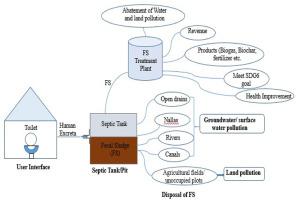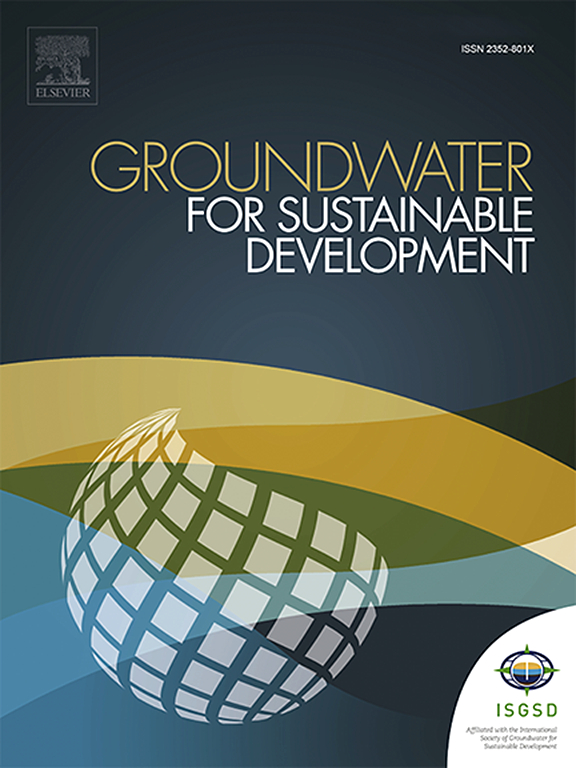印度粪便污泥管理(FSM)现状及最佳解决方案回顾
IF 4.9
Q2 ENGINEERING, ENVIRONMENTAL
引用次数: 0
摘要
粪便污泥(FS)是从化粪池和坑厕等现场卫生系统(OSS)中收集的部分消化泥浆,然后倾倒到河道、明渠、空地和水体中。当前研究的动机是印度在管理粪便污水方面的严峻形势和困难。这项研究旨在全面分析印度城市的粪便污水产量、差距、挑战、影响以及最具成本效益的粪便污水处理解决方案。本研究涵盖了商业化的潜力以及印度城市对处理过的垃圾填埋场的再利用。印度城市的粪便污水管理现状也通过粪便污水流程图进行了报告。在印度城市中,许多化粪池建造简陋、陈旧,不符合规定的规格。地下水是印度最宝贵的资源之一,化粪池渗出或渗入的污染物也会对地下水造成影响。联合国儿童基金会称,如果化粪池处理不当,会污染周围环境,饮用水供应也会引发腹泻、痢疾和霍乱等严重疾病。一项调查显示,印度城市中有很大一部分地区没有污水管道,无法获得足够的卫生设施。因此,迫切需要在这一领域开展研究,以更好地了解 FS 对水资源和土地质量的影响。从家庭用户到经过处理的粪便的最终处置,卫生设施链的每一个环节都需要来自公共、商业和民间社会的许多个人和团体来安全处理粪便。为了到 2030 年实现可持续发展目标 6 "清洁水和卫生设施",发展中国家迫切需要成本效益高的无害环境管理解决方案。本文章由计算机程序翻译,如有差异,请以英文原文为准。

A review of the current scenario and best possible solution for fecal sludge management (FSM) in India
Fecal Sludge (FS) is partially digested slurry which is collected from onsite sanitation system (OSSs) such as septic tanks and pit latrines and dumped into nallas, open drains, open lands and water bodies. The current research is motivated by the awful situation and difficulties associated with managing FS in India. This study aims to provide a comprehensive analysis of FS production, gaps, challenges, impact, and the most cost-effective FS treatment solution for cities of India. The potential for commercialization as well as the reuse of treated FS in Indian cities are covered in this research. The current status of FS management in Indian cities is also reported through fecal waste flow diagram. Many septic tanks are poorly constructed, outdated, and do not meet required specifications in Indian cities. Groundwater is one of India's most valuable resources, and it is also impacted by seepage or infiltration of contaminants from septic tanks. UNICEF claims that if FS is not properly treated, it can pollute the surrounding environment, and drinking water supplies can cause severe diseases such as diarrhoea, dysentery and cholera. A survey revealed that a significant portion of urban India is unsewered and lacks access to adequate sanitation. Hence, there is an urgent need to conduct research in this area to better understand the impact of FS on water resources and land quality. Many individuals and groups from the public, commercial, and civil society sectors are required for the safe handling of FS at every point of the sanitation chain, from the household user to the final disposal of treated FS. To achieve Sustainable Development Goal 6 "clean water and sanitation" by 2030, there is an urgent need for cost-effective FSM solutions for developing countries.
求助全文
通过发布文献求助,成功后即可免费获取论文全文。
去求助
来源期刊

Groundwater for Sustainable Development
Social Sciences-Geography, Planning and Development
CiteScore
11.50
自引率
10.20%
发文量
152
期刊介绍:
Groundwater for Sustainable Development is directed to different stakeholders and professionals, including government and non-governmental organizations, international funding agencies, universities, public water institutions, public health and other public/private sector professionals, and other relevant institutions. It is aimed at professionals, academics and students in the fields of disciplines such as: groundwater and its connection to surface hydrology and environment, soil sciences, engineering, ecology, microbiology, atmospheric sciences, analytical chemistry, hydro-engineering, water technology, environmental ethics, economics, public health, policy, as well as social sciences, legal disciplines, or any other area connected with water issues. The objectives of this journal are to facilitate: • The improvement of effective and sustainable management of water resources across the globe. • The improvement of human access to groundwater resources in adequate quantity and good quality. • The meeting of the increasing demand for drinking and irrigation water needed for food security to contribute to a social and economically sound human development. • The creation of a global inter- and multidisciplinary platform and forum to improve our understanding of groundwater resources and to advocate their effective and sustainable management and protection against contamination. • Interdisciplinary information exchange and to stimulate scientific research in the fields of groundwater related sciences and social and health sciences required to achieve the United Nations Millennium Development Goals for sustainable development.
 求助内容:
求助内容: 应助结果提醒方式:
应助结果提醒方式:


